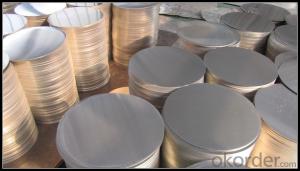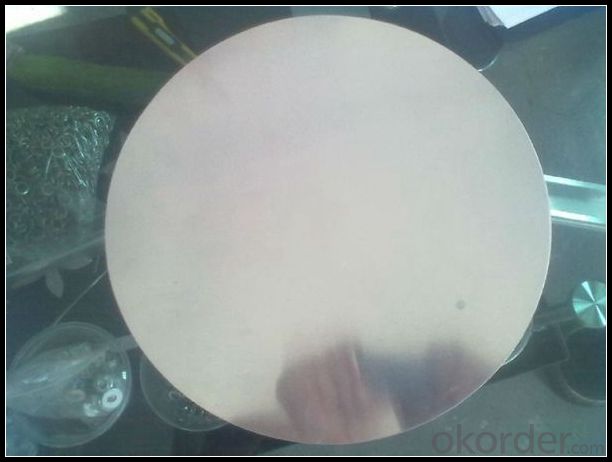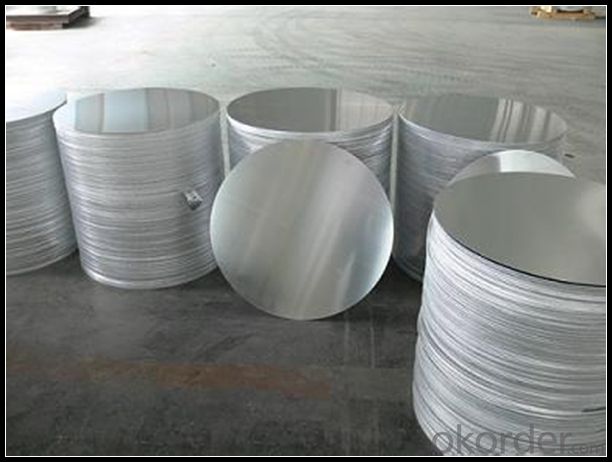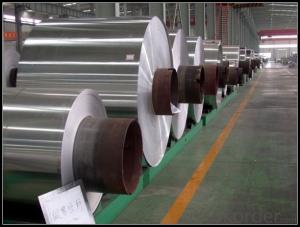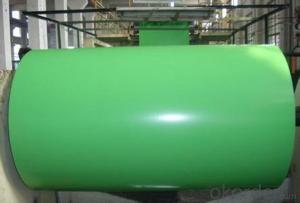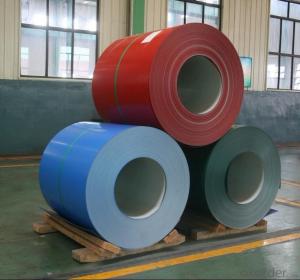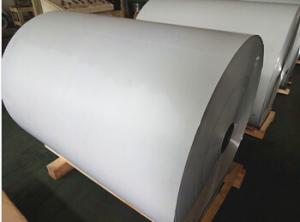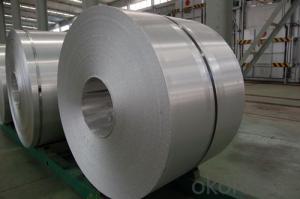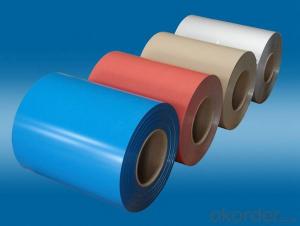High Quality Aluminum Painted Coil for Lamp Shade China Supply
- Loading Port:
- Shanghai
- Payment Terms:
- TT OR LC
- Min Order Qty:
- 5 m.t.
- Supply Capability:
- 3800 m.t./month
OKorder Service Pledge
OKorder Financial Service
You Might Also Like
Specification
1. Specification of Aluminum
1) Alloy | 1050,1060,1100, 3003 3004 3105 3005 5005 5052 etc |
2) Temper | O/H12/H14/H1/H18/H32/H34/H36/H38//H111/H112/H116/H321/T6/T651/T3/T351 etc |
3) Thickness | 0.1mm to 6mm |
4) Width | 20mm to 3300mm |
5) Coil weight | 100kgs to 6 tons depends on actual requirement |
6) Core material | Aluminum alloy |
7) Coil Inner diameter | 76mm, 152mm,or as required |
2. Application of Aluminum
(1).Interior: wall cladding, ceilings, bathrooms, kitchens and balconies, shutters, doors...
(2).Exterior: wall cladding, facades, roofing, canopies, tunnels,column covers , renovations...
(3).Advertisement: display platforms, signboards, fascia, shop fronts...
3. Feature of Aluminum
*Such coil is specially designed to replace aluminum ingot, due to the high export tax of aluminum ingot, the coil has better price than ingot.
*This type of coil can fit customer's remelting furnace just like ingot, no need to make any change to the production line that was previously used for ingot. The standard coil size and weight is very suitable for the feed gate of furnace.
*This type of coil causes less material wastage than ingot when remelted.
*Our coil is made directly from ore, no need to go though the ingot making process, quality is much better than other suppliers who use ingot scrap to make coil.
Be free from Oil Stain, Dent, Inclusion, Scratches, Stain, Oxide Dicoloration, Breaks, Corrosion, Roll Marks, Dirt Streaks and other defect which will interfere with use
4. Certificate:
SGS and ROHS(if client request, paid by client), MTC(plant provided), Certificate of Origin(FORM A, FORM E, CO), Bureau Veritas and SGS (if client request, paid by client), CIQS certificate
5. Image of Aluminum
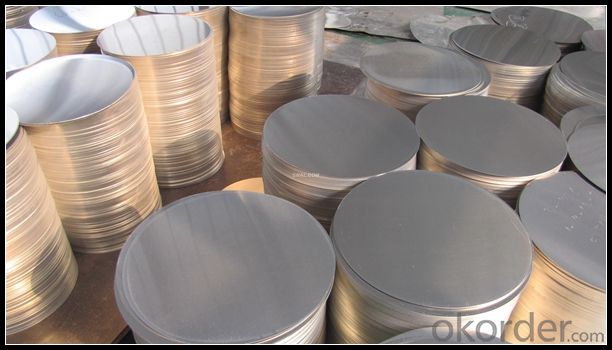
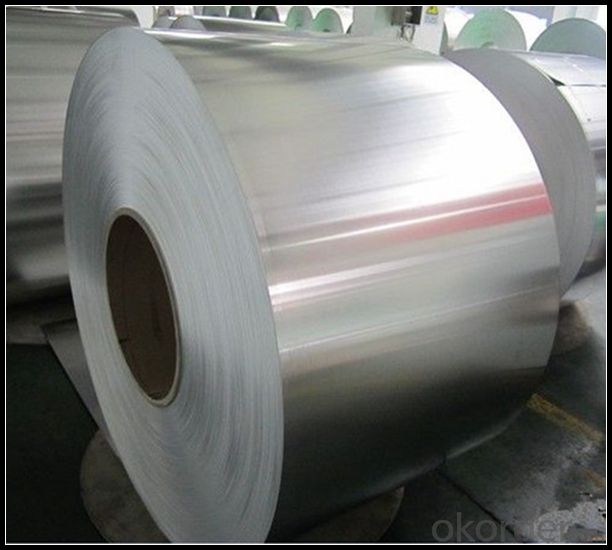
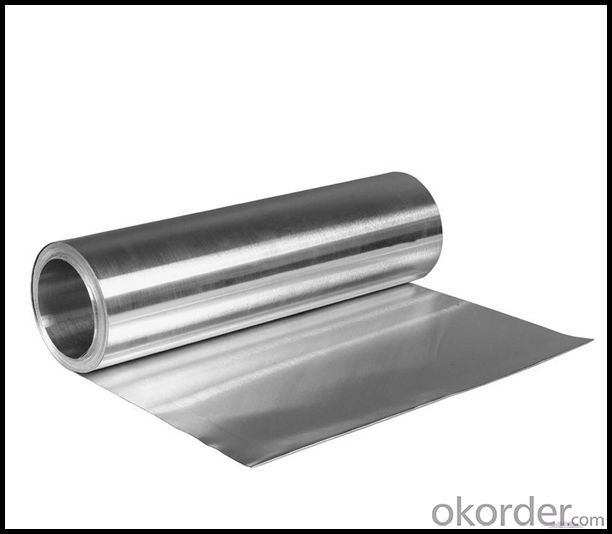
6. Our Service
1. Reply your enquiry in 24 working hours. |
2. OEM, buyer design, buyer label services provided. |
3. Exclusive and unique solution can be provide to our customer by our well traned and professional engineers and staffs. |
4. We can provide free sample for your check |
5. We have the certification of ISO 9001 |
6. Timely delivery |
7. Special discount and protection of sales area provided to our distributor. |
8. Good after-sale service. |
7. FAQ
Q: What is the produce prase? |
A: Normally it would be 40days after received your deposit. |
Q: Can you provide free samples? |
A: Yes, free samples will be sent to you on freight at destination. |
Q: Can I get your latest catalogue? |
A: Yes, it will be sent to you in no time. |
Q: What is the MOQ? |
A: 3 tons |
Q: What are your payment terms? |
A: We accept L/C, D/A, D/P, T/T, West Union,etc. |
- Q: Is it possible to use a magnet to determine if an aluminum coil has magnetic properties?
- <p>No, you cannot use a magnet to test the magnetic properties of an aluminum coil. Aluminum is a non-magnetic material, meaning it does not have magnetic properties and will not be attracted to a magnet. Magnets are used to test ferromagnetic materials like iron, nickel, and cobalt. To test for magnetic properties, you would need to use a different method, such as an electromagnetic induction test, which can detect magnetic fields generated by electrical currents in a coil.</p>
- Q: G'day guys, I'm wanting to get the tinnie out but im not looking on spending to much on oars, Aluminum ones are quite cheap i can pick some up for $50, but i was just wondering if there any good? anyone had good or bad experience with them? and would it just be worth forking out extra for wooden ones?
- G'day Larry, Wooden oars are worth the extra money. Aluminum oars do not have the right balance and they will soon tire you out. If you have a motor and the oars are just for once in a while, aluminum might be ok but if your boat is moving on 'potato power' you would be best to spend the extra on the wooden oars.
- Q: Is it safe or practical to use an electric iron as a heat source for an aluminum coil?
- <p>Using an electric iron to heat an aluminum coil is not advisable. Electric irons are designed to heat their own plates for ironing clothes, not to transfer heat to other materials like aluminum coils. The high temperature of an iron could damage the coil and potentially cause a fire hazard. Moreover, aluminum has a high thermal conductivity, which means it would dissipate heat quickly, making it inefficient to use an iron for this purpose. Always use heating elements specifically designed for the material you intend to heat.</p>
- Q: How do aluminum coils contribute to noise isolation?
- There are multiple ways in which noise isolation can be enhanced with the help of aluminum coils. To begin with, the utilization of aluminum as a material for coils offers exceptional thermal and electrical conductivity, facilitating the dispersion of heat and electromagnetic interference. This, in turn, diminishes the likelihood of noise generated by these factors. Furthermore, noise isolation can be improved by designing aluminum coils with specific properties. By employing thicker aluminum wire, the coil's resistance can be increased, thereby reducing the transmission of electrical noise. Moreover, optimizing the shape and size of the coil can minimize vibrations and resonance, common sources of noise. In addition, the integration of aluminum coils with other noise isolating materials can yield beneficial results. For instance, combining them with acoustic foam or other sound-absorbing materials can create a barrier that prevents sound transmission. The aluminum coil serves as a structural support, while the additional materials absorb and dampen sound waves, further enhancing noise isolation. In conclusion, aluminum coils contribute to noise isolation by dispersing heat and electromagnetic interference, minimizing vibrations and resonance, and providing structural support for other noise isolating materials.
- Q: How are aluminum coils used in the production of consumer electronics?
- Aluminum coils are widely used in the production of consumer electronics for various purposes. One common application is in the manufacturing of heat sinks. Heat sinks are used to dissipate heat generated by electronic components, such as microprocessors, to prevent overheating and ensure optimal performance. Aluminum coils are often shaped into fins or plates and then attached to these components, as aluminum has excellent thermal conductivity properties. Another way aluminum coils are utilized in consumer electronics is in the production of electromagnetic shields. These shields are designed to block or redirect electromagnetic interference (EMI) generated by electronic devices. Aluminum, being a good conductor of electricity, is an ideal material for creating these shields. The coils are formed into various shapes and sizes, depending on the specific requirements of the electronic device, and then integrated into the product's design to minimize EMI. Furthermore, aluminum coils are used in the production of electrical connectors and wiring within consumer electronics. Aluminum is lightweight, durable, and has good electrical conductivity, making it an excellent choice for these applications. The coils are often processed and shaped into thin, flexible strips or wires that can be easily integrated into the electronic circuitry. In summary, aluminum coils play a crucial role in the production of consumer electronics by being used in heat sinks for thermal management, electromagnetic shields for EMI protection, and electrical connectors and wiring for efficient electrical conductivity. Their versatility, combined with their thermal and electrical properties, make them an essential component in the manufacturing process of various consumer electronic devices.
- Q: I'm doing a project on aluminum and this is the one thing i can't find. Also will it rust, tarnish or corrode?
- Aluminum is not explosive, although in the presence of a suitable oxidizing agent it can burn. It does not rust (that concept applies only to ferrous metals), but can corrode and will tarnish rapidly if a cut surface is exposed to air. The tarnish, aluminum oxide, protects the surface from further oxidation, and a process called anodizing puts a heavy oxide layer on the surface for improved protection. Aluminum is produced by electrolysis from aluminum oxide, which is dissolved in molten aluminum fluoride; a typical electrolytic pot uses a current of 5 volts at 105,000 amperes and will produce a ton of aluminum per day.
- Q: What are the common surface treatments applied to aluminum coils?
- There are several common surface treatments that are applied to aluminum coils to enhance their durability, appearance, and resistance to corrosion. One of the most common treatments is anodizing, which involves creating a layer of oxide on the surface of the aluminum through an electrochemical process. This not only adds a protective barrier against corrosion but also allows for the application of various colors and finishes. Another common surface treatment is painting or coating. Aluminum coils can be painted with a wide range of colors and coatings to provide additional protection against corrosion, as well as to improve their aesthetic appeal. These coatings can be applied through various methods, such as powder coating or liquid spray, and can offer different levels of durability and resistance to environmental factors. Additionally, aluminum coils can undergo a process called laminating, in which a protective film or layer is applied to the surface. This film can provide added resistance to scratches, abrasions, and UV rays, making the coated aluminum coil suitable for outdoor applications. Furthermore, embossing or texturing is another surface treatment commonly used on aluminum coils. This process involves creating patterns, designs, or textures on the surface of the aluminum, which not only enhances its visual appeal but also provides additional structural strength and grip. Overall, the choice of surface treatment for aluminum coils depends on the specific requirements of the application, including the desired appearance, durability, and environmental factors. It is important to consider factors such as corrosion resistance, weatherability, and aesthetics when selecting the appropriate surface treatment for aluminum coils.
- Q: What are the different coil widths available for aluminum coils?
- The available coil widths for aluminum coils may vary based on specific requirements and manufacturing capabilities. However, typical coil widths for aluminum coils range from 12 inches (304.8 mm) to 60 inches (1524 mm). These standard widths are commonly utilized in construction, automotive, and packaging industries. Custom coil widths, narrower or wider than the standard range, can also be provided by manufacturers to meet specific customer needs. This allows for increased flexibility in design and application. It is important to acknowledge that the availability of specific coil widths may differ depending on the supplier and the aluminum alloy used. Therefore, it is advisable to consult a reputable aluminum coil supplier to determine the exact range of coil widths available for a particular project or application.
- Q: What are the potential applications of colored aluminum coils?
- Colored aluminum coils have a wide range of potential applications across various industries. One of the main uses is in the construction sector, where colored coils can be used for both functional and aesthetic purposes. They can be applied as roofing material, siding, or decorative elements on buildings, providing protection against weather conditions while also enhancing the visual appeal of the structure. Another potential application is in the automotive industry, where colored aluminum coils can be used for manufacturing car body panels. The vibrant colors and durability of the material make it an attractive option for creating stylish and long-lasting exteriors for vehicles. Colored aluminum coils also find application in the electronics and electrical industries. They can be used to create casings for electronic devices, such as smartphones, tablets, and laptops, adding a visually appealing touch to these gadgets. Additionally, the lightweight nature of aluminum makes it a suitable choice for heat sinks and other cooling components in electronic devices. In the packaging industry, colored aluminum coils can be utilized for creating eye-catching packaging materials for various products. The vibrant colors and sleek appearance of aluminum can help to enhance the shelf appeal of consumer goods, attracting potential buyers. Furthermore, colored aluminum coils can be utilized in the furniture industry for creating modern and stylish furniture pieces. The versatility of aluminum allows for the production of unique designs and shapes, adding a contemporary touch to interior spaces. Lastly, colored aluminum coils can be employed in the signage and advertising industry. They can be used for creating custom signage, billboards, and promotional displays with vibrant and long-lasting colors, making them an effective marketing tool. Overall, the potential applications of colored aluminum coils are vast and diverse, spanning across industries such as construction, automotive, electronics, packaging, furniture, signage, and advertising. The durability, lightweight nature, and aesthetic appeal of colored aluminum coils make them a versatile material for a wide range of purposes.
- Q: Is it possible to utilize a grinder for cutting an aluminum coil?
- <p>Yes, you can use a grinder to cut an aluminum coil, but it's important to use the right type of grinder and blade. An angle grinder with a cutting wheel or a metal cutting disc is suitable for this task. Ensure the grinder is powerful enough for the thickness of the aluminum coil and that you're using the correct safety equipment, such as goggles and gloves. Keep the cutting area clear of debris and ensure good ventilation to avoid inhaling aluminum dust, which can be harmful. Always follow the manufacturer's instructions for your specific grinder model to ensure safe operation.</p>
Send your message to us
High Quality Aluminum Painted Coil for Lamp Shade China Supply
- Loading Port:
- Shanghai
- Payment Terms:
- TT OR LC
- Min Order Qty:
- 5 m.t.
- Supply Capability:
- 3800 m.t./month
OKorder Service Pledge
OKorder Financial Service
Similar products
Hot products
Hot Searches
Related keywords
